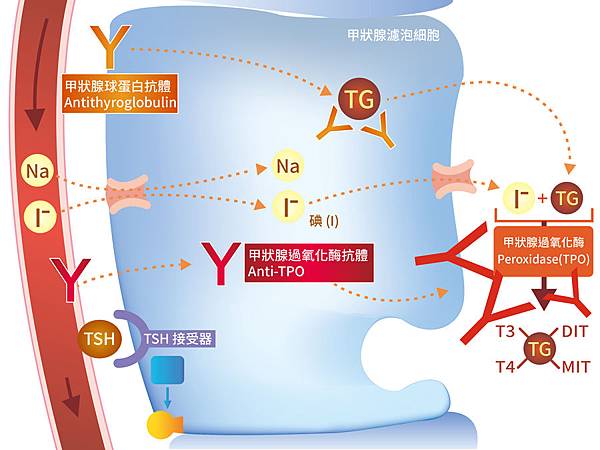
愛群中醫診所 副院長 廖哲誼
甲狀腺抗體對T cell、B cell及NK cell都有影響,導致子宮內膜中的T cell產生變化,增加IFN-γ並減少IL-4、IL-10的分泌,IFN-γ會增強白血球的攻擊性,IL-4、IL-10則會使免疫系統容受胚胎。B cell的活性也會因甲狀腺抗體增強2-3倍並釋放許多無特異性的自體免疫抗體,這些無特異性的抗體可能影響最終形成胎盤的滋養層細胞,導致血栓或干擾荷爾蒙及補體[1]。此外,NK cell過度活化並大量移行到子宮內的狀況,這種變化會影響子宮內正常免疫及荷爾蒙的作用,同時還可能會影響卵子外層的透明帶(zona pellucida)、HCG受器或其他胎盤抗原。
同時,帶有甲狀腺抗體者缺乏維他命D(<10 ng/ml)的機率為一般人的2.5倍,也可能是造成不孕的原因之一。[2]有研究指出若濾泡液中的維他命D濃度每提升1 ng/mL,可使懷孕率增加6%。[3] 維他命D具有抗發炎的作用,同時也能調控許多免疫細胞,諸如巨噬細胞、樹突細胞、T淋巴球、B淋巴球等[4],這些免疫細胞表面都具有維他命D的受器(Vitamin D3 receptor, VDR)。有研究指出一旦VDR基因發生變異,可能對導致諸多自體免疫性內分泌疾病。[5]因此,補充維他命D就現階段研究認為是可行的輔助治療。
最後,自體免疫性甲狀腺炎除了造成不孕外,帶有Anti-TPO的孕婦較容易早產,有研究指出風險是一般人的2-3倍。[6] 患有多囊性卵巢及子宮內膜異位症的女性常伴有甲狀腺抗體,特別是多囊性卵巢的患者,同時帶有甲狀腺抗體的機率為一般人的3倍。[7]因此臨床上若碰到患有多囊性卵巢或子宮內膜異位症的女性,若長時間無法受孕,需考慮潛在自體免疫性甲狀腺炎的可能。
參考資料:
[1] Bussen SS, Steck T. Thyroid antibodies and their relation to antithrombin antibodies, anticardiolipin antibodies and lupus anticoagulant in women with recurrent spontaneous abortions (antithyroid, anticardiolipin and antithrombin autoantibodies and lupus anticoagulant in habitual aborters). Eur J Obstet Gynecol Reprod Biol 1997;74(2):139e43.
[2] Twig G, Shina A, Amital H, Shoenfeld Y. Pathogenesis of infertility and recurrent pregnancy loss in thyroid autoimmunity. J Autoimmun. 2012 May;38(2-3):J275-81. doi: 10.1016/j.jaut.2011.11.014. Epub 2012 Jan 3.
[3] Ozkan S, Jindal S, Greenseid K, Shu J, Zeitlian G, Hickmon C, et al. Replete vitamin d stores predict reproductive success following in vitro fertilization. Fertil Steril 2010;94(4):1314e9.
[4] Boonstra A, Barrat FJ, Crain C, Heath VL, Savelkoul HF, O'Garra A. 1alpha,25- dihydroxyvitamin d3 has a direct effect on naive cd4(+) t cells to enhance the development of th2 cells. J Immunol 2001;167(9):4974e80.
[5] Pani MA, Knapp M, Donner H, Braun J, Baur MP, Usadel KH, et al. Vitamin d receptor allele combinations influence genetic susceptibility to type 1 dia- betes in germans. Diabetes 2000;49(3):504e7.
[6] Ghafoor F, Mansoor M, Malik T, Malik MS, Khan AU, Edwards R, et al. Role of thyroid peroxidase antibodies in the outcome of pregnancy. J Coll Physicians Surg Pak 2006;16(7):468e71.
[7] Janssen OE, Mehlmauer N, Hahn S, Offner AH, Gartner R. High prevalence of autoimmune thyroiditis in patients with polycystic ovary syndrome. Eur J Endocrinol 2004;150(3):363e9.


 留言列表
留言列表
